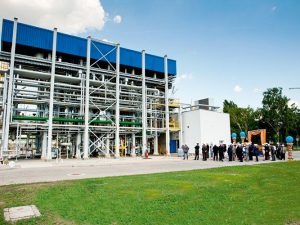Holding
PCC sells its German electricity and gas sales operation to a Spanish investor. This transaction completes the realignment of PCC SE’s Energy division, with the original energy trading business being entirely replaced by PCC’s focus on the development and operation of its own power plants, particularly in Eastern and South-East Europe.
PCC SE establishes the holding company PCC Consumer Products S.A., Warsaw (current head office: Brzeg Dolny) in order to develop a group segment to accommodate businesses manufacturing products both for the company’s own retail brands and for the private labels of other firms.
Chemicals
PCC Exol SA, Brzeg Dolny, commissions its second ethoxylation plant in Plock, some 100 kilometres north-west of Warsaw. The facility has an annual production capacity of 30,000 metric tons of non-ionic surfactants (surface-active substances). Together with the plant already in operation on the PCC Rokita SA site, the annual capacity for the manufacture of these surfactants is this doubled to a total of 60,000 metric tons.

PCC Rokita SA sees its foam technology iPoltec® (Intelligent Polyurethane Technology) generate success in the marketplace. By the end of 2011, 1 million mattress cores have already been manufactured with this innovative technology.

Logistics
PCC Intermodal S.A. opens its Kutno container terminal. It is the first modern logistics and handling center in central Poland. Its handling capacity was 100,000 TEU (unit of measurement for 20-foot ISO containers), a figure that was more than doubled after reaching 250,000 TEU by 2015.

Projects
PCC SE commences planning work for the construction of a modern production plant for silicon metal in Iceland. Commissioning is envisaged in 2017/2018, with annual capacity set at 32,000 metric tons. The objective is to use a portion of the quartzite mined by PCC in Poland as an input material in Iceland.